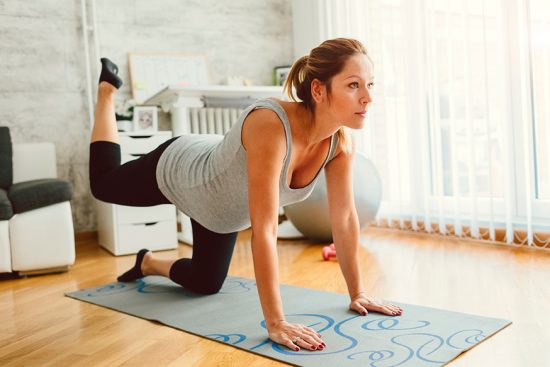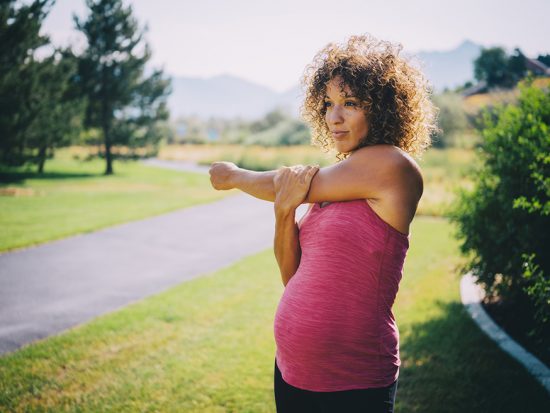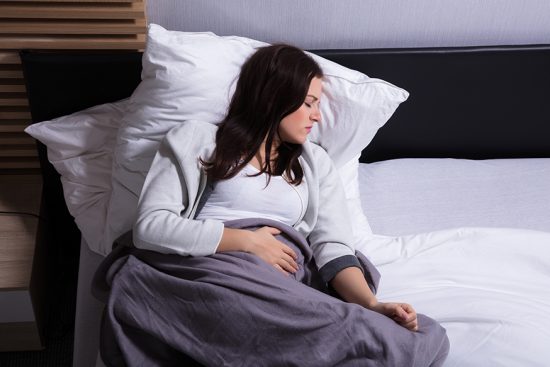From your growing bump to heartburn and (what feels like) a constantly bursting bladder, it can often be hard to get an undisturbed night’s sleep in pregnancy. Try our tips for a better night’s slumber
Planning maternity leave, getting everything ready for the baby and navigating the last few months at work when your energy levels are plummeting…no wonder you need a rest when you’re pregnant. Ironically though, just as you need it most, sleep can become increasingly elusive. Read our tips for a good night’s shut eye even when you’re pregnant and uncomfortable.

It’s normal to feel tired in pregnancy so don’t get frustrated with yourself, as getting worked up will only cause more sleeplessness. Your baby is growing, and your ever expanding bump is understandably making it hard for you to get comfortable at night.
Also, your hormones are likely to be all over the place (with the hormone progesterone adding to tiredness in the first trimester). Worries about what it’ll be like when the baby arrives could be racing around your mind at a rate of knots.
Jenny Barrett, an NCT antenatal teacher, says: ‘Some pregnant mums find that classes such as Yoga for Pregnancy can really help in getting some gentle exercise and learning some relaxation techniques. You could get your partner to give you a massage to help you relax – this is a good way to practise techniques that you could use during labour.’

Pregnancy pillows, or just an extra cushion or pillow, are possibly the favourite sleep aid of expectant mums. They can help support your bump or legs in bed and make you more comfy as your tummy gets bigger. You can even use them to relax on the sofa while you’re reading or watching TV.
NCT member Dara Levan-Harris, mum to Remi and Sunny and member of NCT Hackney branch, says: ‘I slept with cushions when I was pregnant, with my hip bone over the space between the cushions.’
You may fall in love with your big maternity pillows so much that you want to carry on using them after your baby is born – and coincidentally, they make great breastfeeding support cushions too.
Try not to drink very much for a couple of hours before bed
Bladder problems can be twofold in pregnancy. Early on, you might still find you need to pee more often because hormones increase blood flow to your kidneys, producing more urine than usual.
Just as this is settling down in later pregnancy, your growing uterus puts pressure on your bladder – meaning more toilet trips again. Try not to drink too much water or liquid for a couple of hours before you go to bed, so you’re not up so often in the night.
Of course, by the end of your pregnancy, your bladder might feel full even when you’ve just been to the loo as the baby’s head pushes down. Go to the loo before bed, then try and make yourself as comfortable as possible. At least the end is in sight – and if nothing else, it’ll prepare you for night awakenings to come!
Fears about the birth or what life will be like with a newborn have an annoying habit of whirling around your head at 2am. Jenny says: ‘Some pregnant mums have worries about becoming a mum which can be heightened when trying to sleep.’
Being fully informed about your anxiety triggers can help you feel better. If you’re worried about what labour will be like, read up about different birth options and think about your birth plan.
Attending an antenatal class like an NCT course and visiting the birthing centre or hospital you’re going to have your baby can help you learn about what to expect. If you’re planning a home birth, talk to your midwife about what’s likely to happens and what you might need.
However, if you’re constantly feeling anxious and nothing seems to put you at ease, it’s worth talking to your doctor or health visitor about your fears.
Jenny says: ‘Difficulty sleeping can be a normal part of being pregnant, but pregnant mums who suffer with prolonged insomnia might feel they want to speak to their midwife as it can be a symptom of depression. It’s equally important to recognise that sleep problems in themselves can reduce a sense of wellbeing. Trying to find solutions is important, and speak to your midwife if you feel it is becoming an issue.’

Getting lots of fresh air and doing moderate exercise (research has shown that it’s safe to do as much exercise during pregnancy as you were accustomed to doing before) will help you feel more sleepy at night.
Cut down or cut out caffeine, especially later in the day, and stick to government-recommended guidelines on alcohol during pregnancy.
Eat a healthy diet with plenty of fresh fruit and veg, and you might find that herbal teas can help you unwind in the evening.
Do some research before you sip though – while ginger and peppermint teas can help to ease morning sickness, green tea is surprisingly high in caffeine and should be restricted or avoided in pregnancy.

Mums who’ve never suffered from indigestion before can be surprised when they get it badly during pregnancy. It’s caused by their growing baby pressing against their stomach, meaning the muscles between their gullet and stomach relax and let stomach acid come up.
It can come on when you’re going to bed, or you might even wake up with it in the middle of the night. Try to avoid spicy foods or eating too much at one meal, especially near bedtime. Eating little and often is the name of the game in the later stages of pregnancy, and try not to eat in a rush.
When you’re in bed, prop yourself up with pillows so your head and upper body are slightly elevated. If it won’t go away and stops you sleeping, you can try taking an antacid, although check with your doctor or pharmacist first that it’s one that’s safe to take during pregnancy.
Although the name would suggest you’re most likely to suffer early on in the day, for some mums it’s actually in the evening that nausea strikes. It can help to eat small quantities of plain food, like toast or rice crackers, before you go to bed, as having an empty stomach can make you feel more sick. Keeping hydrated can help as well.
Avoid very greasy or sugary food, as this can be harder to digest and make you feel more sick (that’ll help avoid heartburn too).
Get your partner to help out when older children wake up at night
It can be hard enough to get a good night’s sleep in pregnancy, let alone if you’ve already got a little one who wakes up in the night or climbs into bed with you just as you’ve managed to drift off.
Tell your partner if you’re having difficulty sleeping, and encourage them to help deal with your other children in the night. Or, they could get up with them in the morning to give you a bit of a lie-in.
If older siblings sleep through but need constant attention during the day, try and get some sleep or rest whenever you can.
Jenny says: ‘If the older child goes to bed in the evening, you could also go to bed earlier, even if only for a couple of evening in the week to catch up. If your partner is able to take the older child out for a few hours at the weekend you could get some rest then.’
Around the middle of your pregnancy, start to get into the habit of going to sleep on your side. By your third trimester, it’s very important to go to sleep on your side rather than your back, as this can help prevent stillbirth. During this time, if you sleep on your back the weight of your uterus pressing down can reduce blood flow to you and your baby. Don’t worry if you wake up on your back, just turn onto your side to go back to sleep.
Above all, take heart in the fact that although you’re probably not going to get a good night’s sleep when the baby arrives, at least the sleep you do manage to get will be deeper.
One new NCT mum says: ‘Even though my baby often wakes me up in the night now, the sleep I do get in-between feeds is so much better than when I was heavily pregnant and just couldn’t get comfortable.’